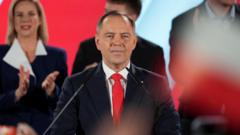In a recent statement, the European Commission expressed strong disapproval of President Trump's decision to increase US tariffs on steel and aluminium imports from 25% to 50%, warning of potential countermeasures as trade negotiations face significant disruption.
**EU Expresses Strong Regret Over US Steel Tariff Increase**

**EU Expresses Strong Regret Over US Steel Tariff Increase**
The EU has condemned the surprise announcement from President Trump to double tariffs on steel and aluminium, heightening tensions in US-EU trade relations.
The article text:
The European Union (EU) has publicly expressed its dismay over President Donald Trump's unexpected plan to raise tariffs on steel and aluminium imports, a move that threatens to destabilize ongoing trade discussions and could have severe repercussions for both economies.
During a rally held in Pittsburgh, a city known for its steel production, Trump announced that the tariffs would jump from 25% to 50%, asserting that this action is aimed at revitalizing domestic industry and enhancing national supply levels. The announcement was met with concern, particularly from EU officials, who indicated that Trump's tariff decision undermines diplomatic efforts to forge a comprehensive trade agreement.
A statement from the European Commission categorized the latest tariff increase as a significant hindrance to ongoing negotiations and noted that it adds uncertainty to the global marketplace, potentially raising costs for consumers and businesses on both sides of the Atlantic. Furthermore, it hinted that the EU is ready to respond with countermeasures should the situation escalate.
The implications also extend to the UK, which recently completed a zero-tariff agreement with the US regarding steel and aluminium, although the deal has yet to be ratified. UK steel producers expressed their discontent, labeling the hike in tariffs as a detrimental blow to the industry, prompting government officials to engage with the US to clarify the situation's effects.
In his remarks, Trump emphasized that this decision would bolster local steel production and reduce the US's dependency on foreign sources, notably China. He even suggested a significant investment in US steel manufacturing through a partnership involving US Steel and Japan's Nippon Steel. However, skepticism remains regarding the actualization of such investments.
Analysts continue to track the impact of Trump's fluctuating tariff strategy, particularly as the legal status of the global tariffs remains contested in court. While previous tariff announcements faced legal scrutiny, the recent steel and aluminium tariffs were not included in these challenges.
The context of this latest tariff hike comes after Trump previously delayed a tariff deadline for negotiations with the EU, but with recent comments indicating frustration with the progression of talks, the possibility of further escalations in trade tensions looms. The situation remains fluid, with potential consequences for global trade dynamics and economic relations between key international players.
The European Union (EU) has publicly expressed its dismay over President Donald Trump's unexpected plan to raise tariffs on steel and aluminium imports, a move that threatens to destabilize ongoing trade discussions and could have severe repercussions for both economies.
During a rally held in Pittsburgh, a city known for its steel production, Trump announced that the tariffs would jump from 25% to 50%, asserting that this action is aimed at revitalizing domestic industry and enhancing national supply levels. The announcement was met with concern, particularly from EU officials, who indicated that Trump's tariff decision undermines diplomatic efforts to forge a comprehensive trade agreement.
A statement from the European Commission categorized the latest tariff increase as a significant hindrance to ongoing negotiations and noted that it adds uncertainty to the global marketplace, potentially raising costs for consumers and businesses on both sides of the Atlantic. Furthermore, it hinted that the EU is ready to respond with countermeasures should the situation escalate.
The implications also extend to the UK, which recently completed a zero-tariff agreement with the US regarding steel and aluminium, although the deal has yet to be ratified. UK steel producers expressed their discontent, labeling the hike in tariffs as a detrimental blow to the industry, prompting government officials to engage with the US to clarify the situation's effects.
In his remarks, Trump emphasized that this decision would bolster local steel production and reduce the US's dependency on foreign sources, notably China. He even suggested a significant investment in US steel manufacturing through a partnership involving US Steel and Japan's Nippon Steel. However, skepticism remains regarding the actualization of such investments.
Analysts continue to track the impact of Trump's fluctuating tariff strategy, particularly as the legal status of the global tariffs remains contested in court. While previous tariff announcements faced legal scrutiny, the recent steel and aluminium tariffs were not included in these challenges.
The context of this latest tariff hike comes after Trump previously delayed a tariff deadline for negotiations with the EU, but with recent comments indicating frustration with the progression of talks, the possibility of further escalations in trade tensions looms. The situation remains fluid, with potential consequences for global trade dynamics and economic relations between key international players.



















